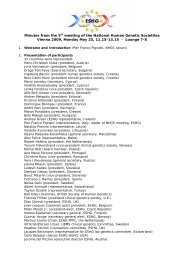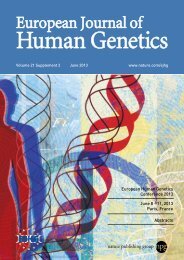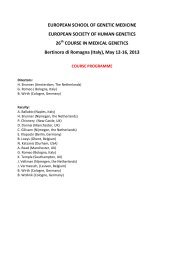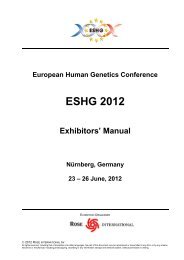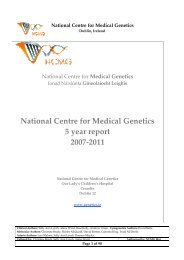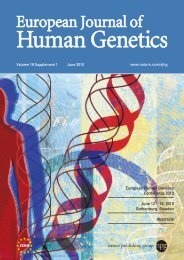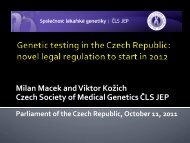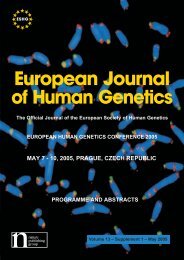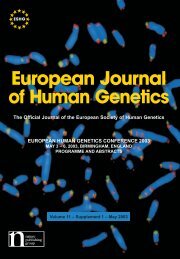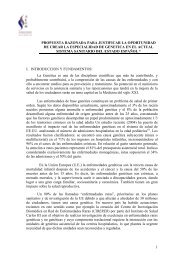2008 Barcelona - European Society of Human Genetics
2008 Barcelona - European Society of Human Genetics
2008 Barcelona - European Society of Human Genetics
You also want an ePaper? Increase the reach of your titles
YUMPU automatically turns print PDFs into web optimized ePapers that Google loves.
EMPAG Posters<br />
insight is gained into the processes within the nuclear and blended<br />
family and the history <strong>of</strong> the extended family . This insight can be useful<br />
in getting a process <strong>of</strong> change going in the way counselees cope with<br />
the genetic information .<br />
EMPAG POSTERS<br />
EP01. Reproductive issues in genetics<br />
EP01.01<br />
How can prenatal genetic counseling be conducted in a country<br />
where abortion is not considered as women’s right?<br />
C. Tamura;<br />
Ochanomizu University, Tokyo, Japan.<br />
Abortion in Japan is primarily illegal with the exception <strong>of</strong> special reasons,<br />
such as maternal health threats, financial difficulties, etc. Fetal<br />
problems are not included in these exceptions . If women want abortion,<br />
they have to ask permission from doctors and partners . When prenatal<br />
diagnosis revealed fetal problems, doctors use a financial reason as<br />
an excuse to allow abortion . In this way, prenatal diagnosis and selective<br />
abortion is available . About one percent <strong>of</strong> all pregnant women<br />
undergo amniocentesis . Pr<strong>of</strong>essional societies established guidelines<br />
for prenatal diagnosis, and state that it can be conducted only to test<br />
childhood-onset severe conditions . If women want prenatal diagnosis,<br />
doctors, <strong>of</strong>ten clinical geneticists, have to make ethically sound judgment,<br />
and will tell women whether or not they can undergo testing .<br />
Although genetics societies have certified some non-MD genetic counselors<br />
recently, genetic counseling in Japan is supposed to be provided<br />
by clinical geneticists, as they have done for over thirty years .<br />
And, clinical geneticists are regarded as authorities who make ethical<br />
judgment on prenatal diagnosis and selective abortion . Thus, genetic<br />
counseling in Japan seems to be a place where clients need to make<br />
an inquiry to ask permission to undergo prenatal diagnosis, and geneticists<br />
sometimes try to convince women not to undergo testing, or<br />
sometimes give clients permission to do it .<br />
Appropriate prenatal genetic counseling approach in Japan should<br />
be considered, but, it is difficult because those who are regarded as<br />
genetic counseling providers believe that their current practice is an<br />
appropriate way <strong>of</strong> genetic counseling in Japan .<br />
EP01.02<br />
PGD for BRcA - a novel clinical experience<br />
M. Sagi, A. Eilat, N. Weinberg N, M. Werner, E. Girsh, Y. Siminovsky, E. Aizenman,<br />
D. Abeliovich, T. Peretz, A. Simon, N. Laufer;<br />
Hadassah University Medical Center, Jerusalem, Israel.<br />
The option <strong>of</strong> <strong>of</strong>fering PGD for BRCA1/2 to carriers who are <strong>of</strong> reproductive<br />
age was recently discussed in the literature . This raises<br />
medical, psychological and ethical dilemmas . Our cancer-genetic<br />
counseling team started recently to discuss this option with young carriers<br />
. Six women, 4 <strong>of</strong> them carrying a mutation in BRCA1 and 2 in<br />
BRCA2, applied for further genetic and reproductive counseling in our<br />
PGD clinic . Four <strong>of</strong> these carriers were healthy but had at least one<br />
1 st degree relative with breast cancer (BC), and 2 were 4 years post<br />
BC diagnosis . All women needed IVF because <strong>of</strong> coexisting infertility<br />
. After counseling, 4 women declined the option (including the two<br />
BC survivors who eventually conceived naturally) and 2 underwent the<br />
PGD procedure. One <strong>of</strong> them conceived in her first treatment attempt.<br />
In this case, 8 embryos with 7 or more cells were biopsied . The blastomeres<br />
were analysed, using PCR for the BRCA2-6174delT mutation<br />
together with linked polymorphic microsatellites . Four embryos were<br />
conclusively diagnosed as BRCA2 wt, 2 <strong>of</strong> these were transferred,<br />
leading to a twin pregnancy . Because the woman would not have terminated<br />
a pregnancy in case <strong>of</strong> misdiagnosis, amniocentesis was not<br />
performed. Her request to confirm the PGD in her newborns after birth<br />
raises additional legal and ethical dilemma <strong>of</strong> testing minors for adult<br />
onset disease .<br />
EP01.03<br />
Hereditary breast/ovarian cancer predisposition and<br />
reproductive decision-making<br />
L. Ormondroyd 1 , C. Moynihan 1 , R. Eeles 2 , G. Evans 3 , S. Lavery 4 , M. Watson 1 ;<br />
1 Psychology Research Group, Institute <strong>of</strong> Cancer Research/Royal Marsden<br />
NHS Foundation Trust, Sutton, United Kingdom, 2 Translational Cancer Genet-<br />
ics Team & Cancer <strong>Genetics</strong> Unit, Institute <strong>of</strong> Cancer Research/Royal Marsden<br />
NHS Foundation Trust, London/Sutton, United Kingdom, 3 Medical <strong>Genetics</strong><br />
Research Group and Regional <strong>Genetics</strong> Service, University <strong>of</strong> Manchester and<br />
Central Manchester and Manchester Children’s University Hospitals NHS Trust,<br />
St. Mary’s Hospital, Manchester, United Kingdom, 4 IVF Hammersmith, Queen<br />
Charlotte’s and Hammersmith Hospital, London, United Kingdom.<br />
Purpose: Mutations in the BRCA1 and BRCA2 genes predispose individuals<br />
to breast, ovarian, prostate and other cancers, generally from<br />
the mid-third decade onwards . Penetrance is not complete, and options<br />
for substantial risk reduction are available . A subset <strong>of</strong> people cite<br />
reproductive decision-making as a motivation for undergoing predictive<br />
testing, but very little is known about how BRCA status impacts on<br />
these decisions . With the recent (2006) decision by the HFEA to grant<br />
licences for pre-implantation genetic diagnosis for late onset cancer<br />
predisposition, this ongoing study exploring reproductive behaviour<br />
and attitudes to prenatal testing and PGD is timely .<br />
Method: A qualitative approach using semi-structured, in depth interviews,<br />
analysed using interpretative phenomenological analysis .<br />
We aim to recruit up to 40 women and men who have had a positive<br />
BRCA1/2 predictive genetic test during the preceding 5 years,<br />
between the ages <strong>of</strong> 18 and 45, who did not have children at the time<br />
they were tested .<br />
Results: Data will be presented from analysis <strong>of</strong> interviews completed<br />
to date . Preliminary analysis indicates that BRCA status does affect<br />
reproductive decision making in a variety <strong>of</strong> ways, including timing <strong>of</strong><br />
having children and number <strong>of</strong> children planned . BRCA status is also<br />
taken into account in partner-relationship building . Prenatal testing,<br />
either pre- or post- implantation would not be considered by interviewees<br />
personally, although they would not object to use by other BRCA<br />
carriers .<br />
EP01.04<br />
Attitudes <strong>of</strong> young women with cystic fibrosis to pregnancy and<br />
motherhood<br />
S. J. Kenwrick1 , E. Chapman2 ;<br />
1 2 Addenbrooke’s Hospital, Cambridge, United Kingdom, Papworth Hospital,<br />
Cambridge, United Kingdom.<br />
Over the past two decades, improvements in treatment have resulted<br />
in most patients with cystic fibrosis (CF) reaching adulthood. Consequently,<br />
more affected individuals are becoming parents . Pregnancy is<br />
not considered dangerous for women with mild disease and good lung<br />
function, but health and survival may be compromised by pancreatic<br />
insufficiency and poor lung function. Clearly, careful counselling is required<br />
to discuss the risks <strong>of</strong> having an affected child, health risks <strong>of</strong><br />
pregnancy as well as how to cope with illness while raising a family .<br />
The purpose <strong>of</strong> this pilot study was to explore psychosocial issues concerning<br />
pregnancy and motherhood among young women with cystic<br />
fibrosis, in order to inform reproductive counselling. Semi-structured<br />
interviews were conducted for five women with CF, aged between 20<br />
and 25, and transcripts subjected to qualitative, thematic analysis .<br />
Emergent themes highlight a wide variety <strong>of</strong> issues for these women<br />
centred around; desire for a family, health risks, relationships and communication<br />
with others, difficulties in motherhood and the prospect <strong>of</strong> a<br />
child with CF . The results show that young women with CF may have<br />
varying attitudes towards pregnancy and motherhood, depending in<br />
part on their current health, their upbringing, pr<strong>of</strong>essional opinion and<br />
social support available . Participants with a strong desire to have children<br />
viewed this as a natural progression and described strategies to<br />
cope with potential health problems . The study also highlights a number<br />
<strong>of</strong> measures that may help in counselling these women, including<br />
access to the experience <strong>of</strong> mothers with CF .<br />
EP01.05<br />
Reproductive decision making in cF carrier couples; an<br />
explorative study in couples with an affected child<br />
R. Jassi, W. H. Beckett, T. Roberts, M. McAllister, D. Scotcher;<br />
Regional <strong>Genetics</strong> Service and Medical <strong>Genetics</strong> Research Group, CMMC<br />
NHS Trust and University <strong>of</strong> Manchester, Manchester, United Kingdom.<br />
This study is part <strong>of</strong> wider qualitative research project exploring reproductive<br />
decision making in cystic fibrosis (CF) carrier couples. Here<br />
we describe the personal experience <strong>of</strong> 19 participants living with the<br />
condition because they had a child affected by CF . Men and women<br />
in each couple were interviewed separately by different researchers in





